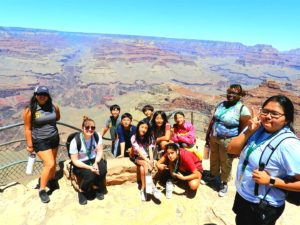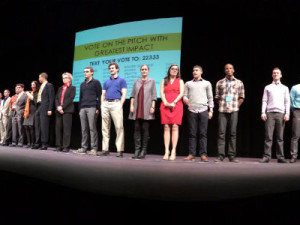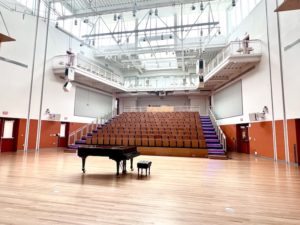- Concerto for Violin in g minor, op. 80, Movement I: Allegro Maestoso by Samuel Coleridge-Taylor
- Concerto for Viola Movement IV: Ritmico by Roberto Sierra
(You can see and hear the competition by clicking HERE.
This piece is for orchestra and choir. It even has a little choreography which adds life to the piece.
The third movement; “III. Amadou Diallo, 23 “Mom, I’m going to college.” touched me in a way that classical music has never touched me before. I’m sitting in the concert hall at the University of Michigan, Ann Arbor and this movement comes up. Out of absolutely NOWHERE my allergies start acting up and someone must have been cutting onions because the audience was just in TEARS!
Which makes me think – isn’t that what great music is supposed to do? Make us feel an emotion or two? Express that which words cannot express?
Berlioz wrote Symphonie Fantastique because he was head over heels in love with a woman (Harriet Smithson) who he heard sing (I don’t think that he actually met her when he wrote the piece). I believe that he wrote her a letter, she rejected him, he writes the piece, she hears it two years later, and then they get married – WILD story!
Beethoven originally dedicated his 3rd Symphony (Eroica – which means Heroic in Italian) to Napoleon Bonaparte. After Napoleon crowned himself “Emperor”, Beethoven thought “Is he too, then, nothing more than an ordinary human being? Now he, too, will trample on the rights of man, and indulge only his ambition!” and took away the dedication.
Playing Kol Nidrei by Max Bruch lead me down a research rabbit hole, learning more about Jewish culture and the Holocaust. I also learned about what some thought about Bruch after he wrote the piece (some people in the world can be oddly mean and judgmental sometimes).
For a bonus, look up why Dmitri Shostakovich wrote Symphony No.5 in D minor, Op.47 in 1937!
My point is that many musical works have stories and history attached to them. I think that we’re not allowing our generation of composers to be great if we’re not playing their works. I’m not talking about playing modern works, or BIPOC works only. I’m talking about diversifying the entire thing like they were doing since the 1400’s (and before).
In the meantime, let me know:
- What diverse composers/music have you heard and would suggest that I listen to?
- Do you think that it is the responsibility of our Symphonies to play these works or is it our responsibility to ask for these works on the feedback forms?
- Gustavo Dudamel – Márquez: Danzón No. 2 (Orquesta Sinfónica Simón Bolívar, BBC Proms) – https://www.youtube.com/watch?v=_1ynC1RB3kY
- Symphony breaks U.S., Cuban barriers – http://www.cnn.com/WORLD/americas/9906/29/cuba.symphony/
- 2023 Sphinx Finals Concert Competition – https://www.youtube.com/watch?v=b9D65zvapo0
- “The Seven Last Words of the Unarmed” | SphinxConnect 2017 – https://www.youtube.com/watch?v=GuT9Ml_Bvx8
0 Comments
Leave a reply
You must be logged in to post a comment.











